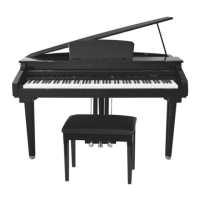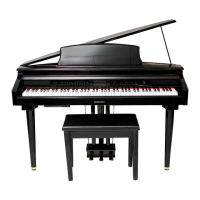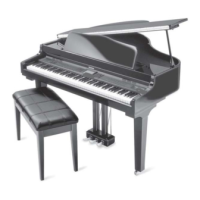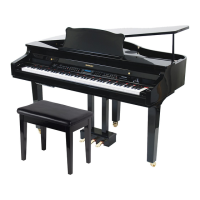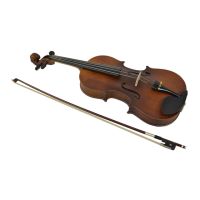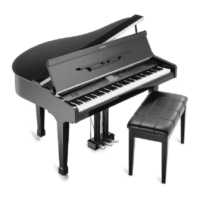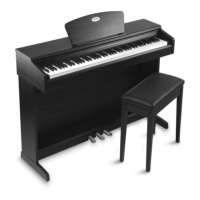
Do you have a question about the Suzuki Grande Ensemble HG-500EX and is the answer not in the manual?
| Brand | Suzuki |
|---|---|
| Model | Grande Ensemble HG-500EX |
| Category | Musical Instrument |
| Language | English |
List of parts required for assembling the Grand Piano model.
Parts list for assembling the HP-300EX model.
Details controls like Power, Pitch Bend, Volume, Demo, and MIDI.
Details controls like Escape, Set Up, Screen Hold, Soft Keys, Screen navigation, and Tempo.
Details controls for Grand Piano reset, Octave, Harmony, Drum, Upper, Layer, and Lower modes.
Selects one of 16 voice buttons for keyboard voices.
Stores keyboard settings like style, voice, and chord.
Piano has a 16-track music recorder.
Explains elements like Rhythm Style, Registration, Tempo, and Volume Controls.
Methods for selecting keyboard voices using buttons and data wheel.
Explains Upper, Layer, Lower, and Drum modes.
Steps to assign a split point on the keyboard.
Steps to select and play rhythm styles.
Steps to engage chord accompaniment.
Explains fingered and piano chord modes.
Produces orchestrated accompaniment using major, minor, diminished chords.
Options for Chord Hold and Auto Variation.
Explains how harmony enhances melodies.
Steps to engage harmony and select modes.
Used to adjust various parameters.
Offers menus for Transpose, Tune, Pitch Bend, etc.
Offers menus for Sounds, Volumes, Reverb, etc.
Details soft key functions for Transpose, Tune, Pitch Bend, etc.
Assigns pedal functions like Start/Stop, Intro/Ending, Fill, and Lower Hold.
Configures sustain for melody channels.
Details soft key functions for saving registration parameters.
Explains reverb simulation and types.
Explains effect types and their use.
Explains Real-time, Automatic, and Step recording.
Steps for setting up real-time recording.
Steps to record and play back musical passages.
Instructions for continuing recording with multiple tracks.
Steps to delete tracks from the record menu.
Selects track to delete using the Delete Track soft key.
Process of moving from play mode to record mode for punching in/out.
Process of moving from play mode to record mode for punching in/out.
Instructions for engaging the Real-time Punch In, Punch Out recording function.
Lists options for style recording.
Explains controls for Reverb, Pan, and Volume.
Accesses and plays patterns from the keyboard.
Accesses tracks for viewing and recording.
Edits events on the track for corrections.
Displays edit screen for modifying mistakes.
Arranges bars on a track for copying.
Accesses block copy screen and controls copy functions.
Clears all tracks to record a new style.
Accesses new style screen and controls parameters.
Transfers selected style to user area.
Saves current style for user playback.
Accesses store in user screen and controls naming parameters.
Building styles by reconstructing riffs.
Instructions for recording new user style.
Teaching package for pitch and rhythm.
Load songs from floppy disk for practice.
Game-based learning for musical phrases.
Displays Song Teacher and Music Games sections.
Details Play Song, Accompaniment Mute, and Right/Left Hand tests.
Describes types of tests available for learning.
User looks at score to play notes correctly.
Describes Rhythm Teacher and Rhythm/Note Teacher tests.
Tests user's rhythm and timing.
Tests rhythm and timing accuracy.
Displays Music Game screen with skill levels.
Displays notes test screen for music games.
Accesses notes test screen and starts games.
Engages teacher mode for display and parameter adjustment.
Accesses teacher setup screen by pressing the Setup button.
Information on loading, saving, and managing disk files.
Displays disk options for managing sequences, registrations, and styles.
Details Load, Save, Rename, Delete, Sequence, Registration, and Styles functions.
Steps to load song data from a disk.
Displays songs on the disk for selection.
Selects song file to load.
Steps to save sequences, registrations, and styles to disk.
Allows naming the song before saving.
Saves song sequence with a new name to disk.
Instructions for renaming files on the disk.
Renames song files on the disk.
Saves renamed song sequence to disk.
Steps to remove files from the disk.
Displays songs on disk for deletion.
Selects file to delete.
Instructions for playing songs from disk.
Selects the MIDI file to play.
Selects the MIDI file for playback.
Details channel selection, mute, reverb, effect, pan, and volume controls.
Sets balance between MIDI data and keyboard volume.
Prepares disk for proper use.
Steps to format a disk including caution screens.
Enables disk functions for registration and style operations.
Instructions for selecting a registration.
Saves setup parameters into registration banks.
Overview of the 16-track MIDI recorder.
Lists features like track editing and lyric display.
Loads MIDI files from floppy disk into the sequencer.
Accesses sequencer main menu functions.
Details track screen options for recording and editing.
Edits events on the track for corrections.
Edits data found on the selected track.
Edits global parameters of song data for the master track.
Displays lyrics of prerecorded songs.
Replicates portions of recorded data.
Discards old data and starts a new sequence.
Explains MIDI capabilities and terminals.
Lists MIDI menu options like MIDI, Expander, and Channels.
Details expander screen functions.
Sets keyboard to accept MIDI data on specified channels.
Sets keyboard to send MIDI data on specified channels.
Details MIDI functions, transmitted/recognized data, and remarks.
Details MIDI expander chart functions, transmitted/recognized data.
Lists MIDI program numbers and voice names for various categories.
Lists various style categories like Pop, Rock, Disco, Waltz, Swing, Ballad, Country, Big Band, March.
Lists the 8 drum kits and the piano drum map.
Lists notes and names for the standard drum kit.
Continues the drum list and details changes for specific kits.
Describes the functions of the three pedal controls.
Describes headphone, audio in/out, and MIDI jacks.
Steps to perform a hard reset on the piano.



